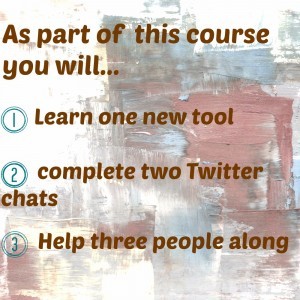Passive Participant, Invited to Reflect
It turns out I have dueling purposes today participating in Project Roundtable: What is the Moral Imperative as Educators to share our work? I am constantly taking the pulse of these asynchronous meetings, trying to internalize the composition and tempo for reference at a future date when I try one. However my other purpose today turned out: how can a passive participant like myself really participate in the thinking occurring in these roundtable sessions?
You might want to check out this Hangout on Air for yourself. You can also view the notes associated with this Roundtable.
This hangout, inspired by Amy Burvall’s Ignite talk from ISTE 2014. Once I understood that I was game to listen to why I should be doing more than just observing. I think it is a brilliant pivot point to make the sharing aspect extend to every passive participant if they will only opt-in.
Can I Model, Provide Scaffolding for Sharing amongst Teachers?
The connection I made between the thoughts of the experts and my current situation is really around what can I offer teachers within my district? I believe I can offer some authentic groups of teaching peers who can be set-up to successfully share with each other first and then a larger audience.
I am considering a Learning Communities model. Participants would opt into a Learning Community, I can construct re-certification credits to accompany the year/semester-long community study around a topic (Flipped Classroom, Blended Learning, etc.). Within the class construction build in videos with sharing opportunities within and outside the class. And to Ben’s point about sharing out “to the void” and “posting to no one and everyone at the same time” I would require a blog set-up by the students to be the place they post their reflections and also request that URL be shared within the course to require other participants to read and comment to that blog post. Ben articulated very well that commenting is a lower risk activity and can offset that ambiguity about the consumption of those first blog posts. At the conclusion of the course the teacher can still have their blog, a record of challenging ideas and their personal perspective to build off of.
One of the easiest take-aways came from Ken in his idea to challenge each teacher to:
(0-join Twitter)
1 learn one new tool
2 write two blog posts
3 hold the hands of three new people
I would tweak this slightly and require Twitter as a course prerequisite and the blog posts as part of the class. However, keep the 1-2-3 easiness of the independent activities for the course. I could very easily provide a rubric for learning a new tool and the blog post/Google Hangout presentation I might request they provide on their new tool. I could capture a time lapse of participating in a Twitter chat very easily and I could assure them that any help they provide in-person can be conveyed through a blog post. I think this would easily bring the stakes down for sharing while maximizing the potential impact the teacher would have – hopefully hooking them on the feeling of sharing with peers.
My team at the district level does incorporate the “shout-out” to other teachers in the district through social media. It is very slow to catch on, but some influential folks are starting to acclimate to the value of public praise for others in this format.
Amy also spoke about teachers “amplifying student’s work” which really resonated with me as I have said technology amplifies good teaching for years. I think the shift in perspective was a good as I notice my tendency to perpetuate the current model of teaching with certain groups of teachers and main idea here is the benefit of sharing – for all stakeholders.
I think what I can uniquely provide teachers taking such a course: I can create an in-course sharing venue which is safe and has a high level of positive participation and I can provide step-by-step guidance to participate in sharing of new tools/ideas, Twitter, and face-to-face mentoring.
Other tidbits I gleened which I hope to plug in along the way:
- David’s Pledge/Promise sheets
- #FF to students
- Afraah (student): provide your students with an audience – of yourself!
Thank you to such a timely and clever panel of experts today!
To top it all off, if all this great learning wasn’t enough, there is a badge to be earned if I submit this reflection.






Leave a Reply